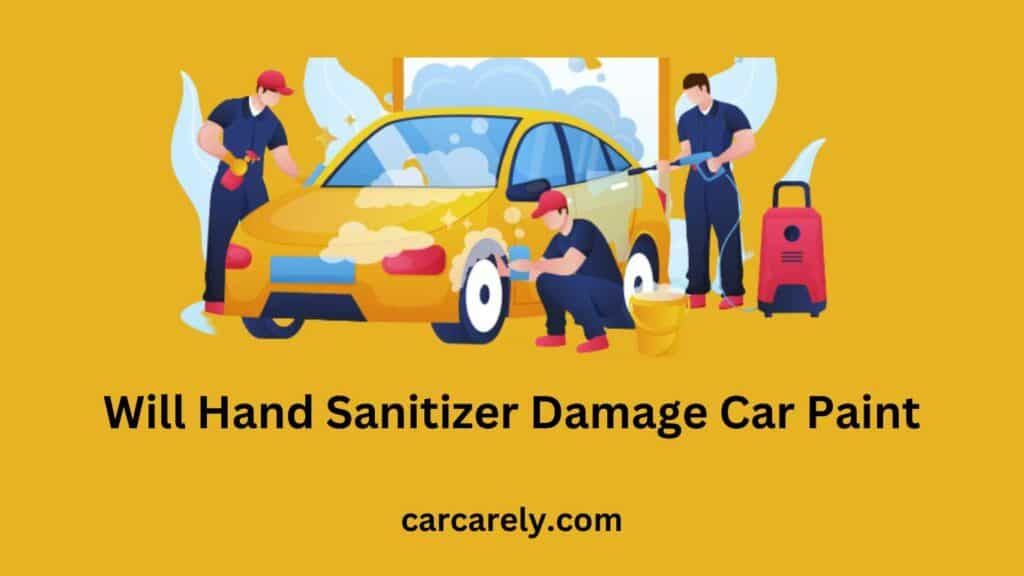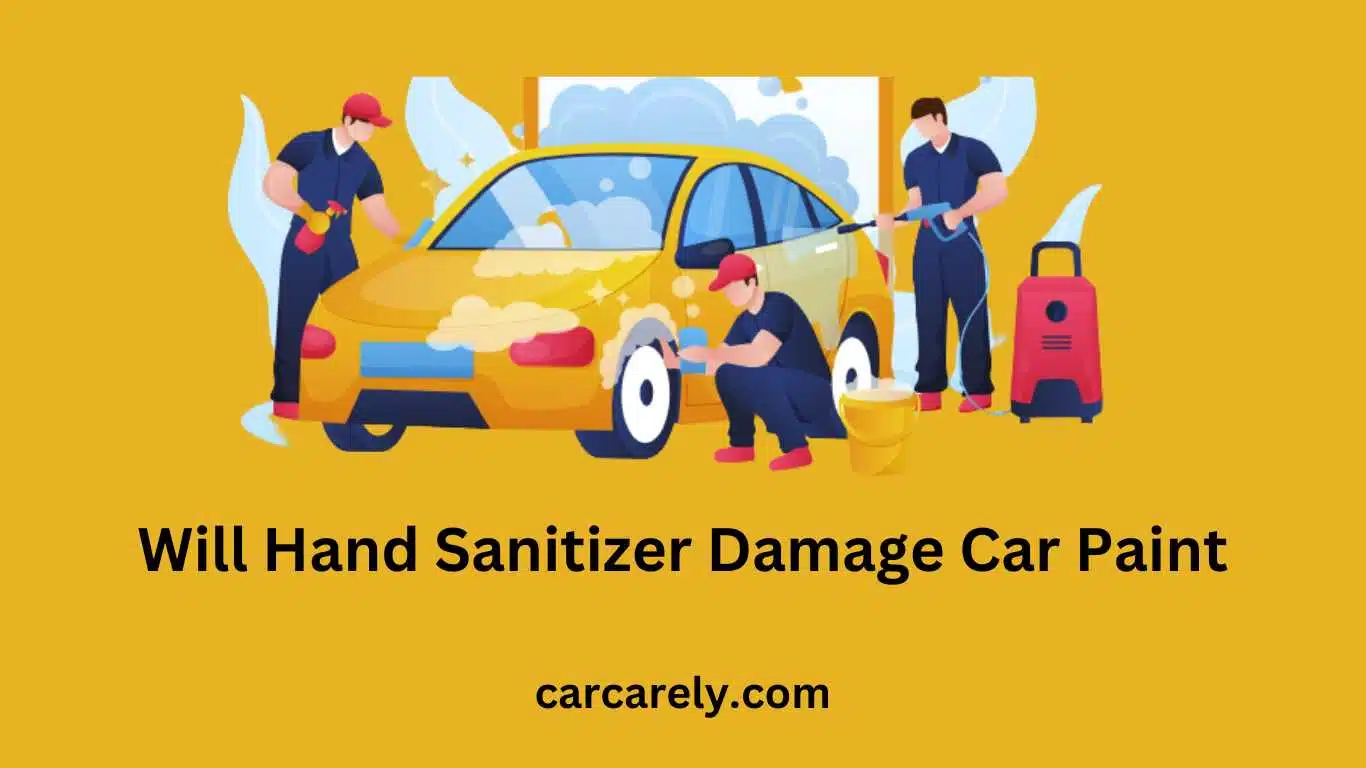Undoubtedly, hand sanitizers are an essential part of our lives. After around two to three years of living with COVID, we became even more accustomed to using hand sanitizers to keep ourselves and our loved ones safe.
Everyone loves to be protected from germs. However, as a car guy, you might wonder, Will Hand Sanitizer Damage Car Paint? Well, the answer is going to surprise you.
So, without any further ado, let’s look at how hand sanitizer can affect your car’s paint. Will they ruin your car paint?
Will Hand Sanitizer Damage Car Paint?
The quick answer is no – hand sanitizers will not likely damage car paint. If you use the right-hand sanitizer correctly, the product will not affect your car’s paint.

However, it is crucial to remember that not all hand sanitizers are the same. Most hand sanitizers are neutral and will not cause any damage to your car’s paint.
Some do have a high concentration of alcohol, which can be very harsh on car paint. This is why it is essential to read the label carefully before using any hand sanitizer and to choose a milder option if possible.
Why Use Hand Sanitizer On Car Paint?
We know that hand sanitizers are disinfectants to protect ourselves and our loved ones from germs. But why would anyone consider using it on a car?
The same real-life rule applies to car care, too. You may want to keep your car free from disinfectants and bacteria; hand sanitizer can help you achieve this goal quickly.
But always remember that our car paint is pretty sensitive to even a tiny amount of damage, as it comprises layers and layers of clear coat, probably four layers of paint.
This means that even the slightest damage could be enough to ruin the shine of your car’s paint. For instance, if you rub a hard material on the paint, it can damage the surface of your car’s paint.
So, will hand sanitizer do the same? Fortunately no!
If you use a small amount of hand sanitizer with low alcohol concentration on a small area of your car and rub it gently on your car’s paint, you will not have any trouble.
Does Hand Sanitizer Even Work on Car Paint?
In a nutshell, hand sanitizer can work well on car paint if appropriately used.
As I mentioned above, if you use a small amount of hand sanitizer in a small area, you can use it safely on your car’s paint. Just make sure that the product is alcohol-free and mild.
For example, suppose you want to clean the bird dropping or a little stain on your car’s paint. You can use hand sanitizer to clean it quickly without making any scratches.
I do not recommend this practice for cleaning the whole car with hand sanitizer. You may never want to destroy your car’s paint, nor do I!
Avoid using it on your whole car paint, and you will not have any trouble.
How to Use Hand Sanitizer on Car Paint – The Right Way
If you are willing to use hand sanitizer on your car’s paint, there are some essential things that you should never forget.
1. Always Use a Low Alcohol Concentration Hand Sanitizer
As I mentioned earlier, different hand sanitizers contain different levels of alcohol. This means some hand sanitizers can be harsh on car paint, while others may not.
So, before using hand sanitizer on your car’s paint, ensure that your product is alcohol-free or has a low alcohol concentration.
Because the lower the alcohol concentration, the safer it is for your car’s paint.
Though using an ordinary sanitizer could be acceptable too, I never recommend that as the chances of damaging your car paint are higher.
2. Use It in a Small Area
If you want to use hand sanitizer on your car’s paint, do it on a small area of the car and gently apply it in a back-and-forth motion.
Using it on a small area of your car’s paint means the risk of damaging it will be minimal. Rubbing gently will ensure you do not damage your car’s paint either.
3. Wipe the Hand Sanitizer Off Quickly
Another critical thing to remember is to wipe the hand sanitizer off your car paint quickly. Doing so will minimize the chances of damaging your car’s paint.
Although Isopropyl alcohol does wipe off by itself when exposed to air, it is still essential to do it quickly and ensure your car’s paint is safe.
You can do this by using a clean and soft microfiber cloth.
4. Wash Your Car with Water and Soap after Using It
When you are done using hand sanitizer on your car’s paint, it is wise to wash your car with water and soap as soon as possible.
This can help you remove any residue or product left behind, thus ensuring that your car paint stays protected.
5. Never Use It On Plastic and Leather
Just as you may not want your car’s paint to be damaged by hand sanitizer, it is also essential that you do not accidentally damage the leather or plastic surface of your car.
Car paint can resist hand sanitizer, but leathers and plastics are not. So, avoid using hand sanitizer in these areas of your car.
Things You Can Use Other Than Hand Sanitizer On Car Paint
Even hand sanitizer use is safe, but it is best not to use it.
I suggest you consider alternatives to hand sanitizer, such as using a car cleaning product, sap remover, or going the old-fashioned way by washing your car with soap and water.
These methods will yield better results than using hand sanitizer on your car paint, and they are also 100% safer for your car, resulting in a clean and shiny car.
So, take care of your car paint by avoiding hand sanitizer and using suitable alternatives instead!
Hand Sanitizer On Car Paint In A Nutshell
Using hand sanitizer on your car paint is pretty safe if you use the right one correctly.
Just be sure you use a hand sanitizer with a low alcohol concentration, apply it on a small area of your car, gently rub it off, and wash it with water and soap afterward.
To avoid using hand sanitizer on your car’s paint, consider using car cleaning products, sap remover, or washing your car with water and soap.
This way, you will get the clean and shiny car you want without compromising the safety of your car paint. After all, your car is too precious to be damaged by hand sanitizer!
FAQ
Does hand sanitizer hurt paint?
Hand Sanitizers can damage paint if they contain high levels of alcohol or are left on car paint for a long time. To avoid this, use a hand sanitizer with low alcohol levels and wipe it off as quickly as possible.
Is rubbing alcohol OK on car paint?
It is generally not recommended to use rubbing alcohol on car paint. But if you use it in a proper ratio of 10-15% rubbing alcohol with 85-90%, using it this way will not damage your car paint.
How do I remove hand sanitizer from my car?
You can remove hand sanitizer by washing with soap and water, using a car cleaning product, or using a sap remover.
Read More:
